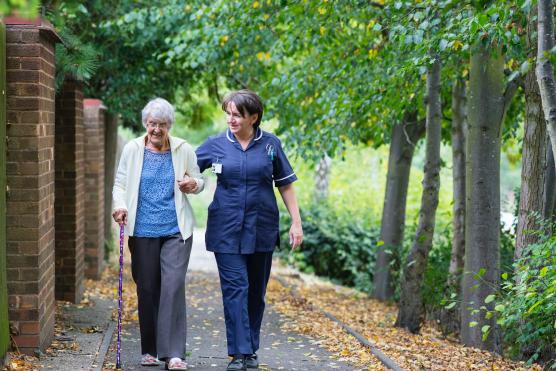Until you walk a mile in my shoes…
I speak today on behalf of partnered-caregivers; I use the term “partnered” rather than “spousal” to acknowledge all of the situations where someone is caring for a partner who is the love of their life.
I have been providing care to my partner since they were disabled twenty years ago - just three years into our marriage. I belong to a network of partnered-caregivers, and I can tell you that there are many, many people in my same situation. There are few resources for us to utilize; few support groups for us to turn to; we live in a hidden world.
We learn early on that when someone asks “how are things going?” they don’t want the real answer, so we learn to smile and say “it’s fine” or “we’re good” or “we’re managing.” We learn to bite our tongues and not scream at phrases like, “you’re so strong” or “you make it look easy.” My (least) favorite is when someone learns about my situation and says, “I never would have guessed. You always seem to have it together.”
Caregivers are strong and have it together because we don’t have a choice. For the vast majority of us, if we fall apart, there’s no one to pick up the pieces. We can’t afford to break. We don’t ask for help. We cry alone in the shower. We cry alone in our cars. We cry alone in our pillows, in the deep of night, when no one will hear us.
Partnered-caregivers are most often thrown into the role with little or no warning, perhaps because of an accident, a sudden illness, or an expected diagnosis. It’s not something partners discuss or plan for. Partners discuss the happy plans; they create bucket lists together, they think about happy futures, they plan for retirement. They don’t discuss how to handle things or how their relationship might change after a serious vehicle accident or a fall or a diagnosis of cancer or early onset dementia or progressive MS or any number of things that takes us into this hidden world.
The onset of caregiving is the crisis stage. It’s a period punctuated by little sleep, poor diet, lots of hindsight, much paperwork, and tons of fear. There’s no room for anything else as all of the caregiver’s resources are shifted to the partner. Depending on the nature of the event, this crisis stage can go on for a long period of time - even a year or two, and it can occur more than once in the lifetime of a partner’s illness or disability.
Then, most - I recognize this is not true for all - but most, settle at some point into a monotony of care. This is a stage at which the partner is stable but requiring regular, if varied, levels of assistance.
By this point, though, the relationship between caregiver and partner has changed. There’s something about having to clean up a partner’s bathroom messes or feed them or monitor all their medications or deal with their ups-and-downs that changes the nature of love between them from eros to pragma. The sense of being “in love” and the romantic nature of love between caregiver and care receiver is lost. What is left is love that stems from obligation and commitment, a love based on what should have been.
Many care receivers, either because of the nature of their illness or disability or because of medication that has been prescribed, lose their longing for touch or intimacy. In my particular case, my partner suffers from chronic, debilitating pain (among other things) and hates to be touched - not even for a hug. There are plenty in that situation. But I also know many more caregivers whose partners are on combinations of medication that rob the person of any libido or desire for intimacy; I know caregivers whose partners are simply not capable of intimacy; I know caregivers whose partners are fighting an illness or disability so hard that their body doesn’t have room for anything else. Caregivers, in this stage, suffer from a poverty of intimacy.
All humans have a need for touch, for intimacy...even the simple touches of holding hands, soft or deep or long hugs, having a back rub, having an arm over their shoulders, cuddling...it’s not all about sex (although that is a critical component, too). To realize that you will never again have that kind of intimacy with your partner, that kind of touch with the person you committed your life to, is a devastating loss because it’s such a basic human need. When I touch my partner now, it’s clinical and precise, aimed at causing the least amount of discomfort. So, it’s been ten years since my partner has touched me in any intimate way, ten years since we’ve slept in the same bed, ten years since we’ve had sex, and I struggle with that loss every day. It’s a painful aspect of the ambiguous grief that caregivers suffer: grieving the loss of someone who is still alive.
But, caregivers are human, too, and that need is hard to deny. It becomes another rock to carry, a quiet burden to bear. It’s not how our partners want us to live. It seems almost weekly that someone in my caregiver network shares that their partner has told them to leave them, to find happiness elsewhere. I am one of many caregivers whose partners have given permission for me to meet my needs outside of our relationship.
Yet, there’s little outlet for a caregiver. There’s no “match” for caregivers. And those who are brave and seek intimacy outside the boundaries of their partnership are often met with judgement and scorn.
I’ve lost friends and been subjected to lectures from family members for suggesting I might look outside my partnership. I’ve been belittled and called names. I won’t tell you the number of times I’ve had “you’re violating your vows” thrown in my face when I’ve even broached the subject. None of us are leaving our partners; we all continue to support our partners “in sickness;” we “honor and cherish” them with our continued care. We uphold our commitments with someone who is, largely, incapable of ever returning the same.
Going out with someone with whom we can have meaningful conversation, someone who can hold or hug us, who can fulfill needs that our partner can no longer meet does not mean that we are bad people. It means that we are human.
Don’t judge us until you walk a mile in our shoes.
















